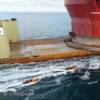The European Sea Ports Organisation (ESPO) issued a statement to contribute to the Commission’s Maritime Year and to follow up on the Valletta Declaration, the ministerial declaration on maritime transport, adopted on March 28 focusing on competitiveness, digitalization and decarbonization.
“We welcome the Valletta Declaration as a first milestone of the Maritime Year,” said ESPO’s Secretary General, Isabelle Ryckbost.
Isabelle added, “We hope that the Maritime Year will reinforce the support for modern, sustainable and well-connected European ports, will pave the way for maritime trade facilitation and simplification and, last but not least, will embrace the sustainable agenda of European ports”.
“We look forward to working further with the Commission and with the Maltese and Estonian Presidencies to make this Maritime Year a success in strengthening the European maritime and ports sectors,” said ESPO’s Chairman Eamonn O’Reilly.
In essence, ESPO’s statement reiterates the importance of well-connected and modern ports. Ports in Europe are facing several challenges that have a major impact on the requirements for infrastructure investments’ needs. For European ports it is important that Europe continues to increase its investments in the port sector.
CEF grants are and must remain the critical component of the funding mix. ESPO calls on European and national policymakers to consider ports as strategic assets. Investments in essential and/or critical European port infrastructure of general interest should be assessed from that perspective.
As regards air quality, ESPO very much welcomes the decision of IMO to introduce a global 0.5 percent sulphur cap in 2020. This decision is expected to bring enormous environmental and public health benefits.













